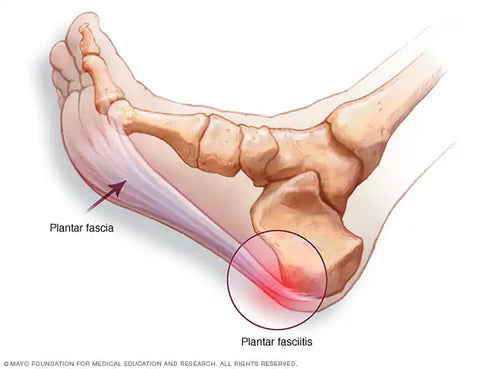Difference between flatfoot and plantar fasciitis
Flatfoot and Plantar Fasciitis are conditions of the lower extremities that affect individuals of all ages. Flatfoot is a condition that affects the arch of the foot. It is ypically caused by a strain or tear in the tibialis posterior tendon, ligaments, or bones. Plantar Fasciitis is a condition which affects the plantar fascia. It is caused by repetitive stress and strain on the fascia and the ligaments of the foot.
The most common causes of Flatfoot and Plantar Fasciitis are overuse of the muscles, tendons, and ligaments of the foot. Excessive standing and walking, as well as overtraining activities, such as running, can contribute to the development of these conditions. In addition, medical conditions, age, and poor shoe support can cause or worsen the symptoms of these conditions.
The most common symptom of Flatfoot is an inward rolling of the foot and an inability to support the individual’s body weight. This can lead to pain, inflammation, and tenderness of the foot, as well as difficulty walking and standing. With Plantar Fasciitis, the individual may experience swelling, pain, and stiffness of the arch of the foot. It can be accompanied by tenderness on the bottom of the heel and arch. Common treatments include rest, ice, compression, elevation, stretching and strengthening exercises, orthotics or orthopedic shoes.
Which age groups can benefit from PROTETIKA sandals, if they have plantar fasciitis
1. Adults: Adults are likely to benefit because the shoes provide arch support and cushioning that can help relieve pain and discomfort.
2. Older people: Older people are more susceptible to having plantar fasciitis due to the weakening of the muscles and ligaments in the foot. The supportive structure and cushioning of PROTETIKA can help provide relief for those suffering from the condition.
3. Athletes: Athletes are more prone to developing plantar fasciitis due to the extended amount of time spent on their feet. The arch support and cushioning of PROTETIKA help to provide relief and comfort to athletes so they can perform without pain or discomfort. Obviously our sandals are intended for the time spent resting after an athletic performance.
4. Heavy Walkers: People who are on their feet for long periods of time, such as heavy walkers, can benefit from the arch support and cushioning of PROTETIKA. These shoes help to reduce the strain on the feet. They provide comfort, which can help reduce the risk of developing plantar fasciitis.
5. Overweight Individuals: Overweight individuals have an increased risk of developing plantar fasciitis due to the extra weight that their feet must bear.
PROTETIKA orthopedic shoes are an excellent choice for those who are prone to developing plantar fasciitis. The supportive structure and cushioning of the shoes help to reduce strain on the feet, providing relief and comfort. Adults, elderly people, athletes, heavy walkers, and overweight individuals are likely to benefit from PROTETIKA cork orthopedic sandals because they can help reduce the risk of developing the condition. The arch support and cushioning help to provide relief and comfort. For those suffering from plantar fasciitis, PROTETIKA orthopedic sandals can be a great choice for helping to relieve pain and discomfort.
Read more on plantar fasciitis here:

